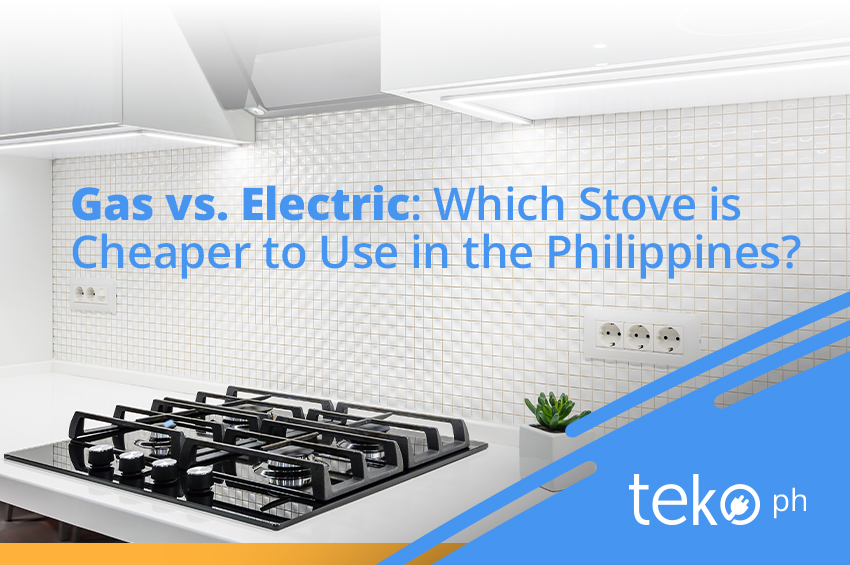
Looking to buy a stove for your new home or do you plan to upgrade your kitchen equipment? Although electric stoves and gas stoves can do the work, it can be confusing to choose from the many options available. We’re Teko.ph, the largest aircon and appliance services provider in the Philippines, and we’re here to help you! Here’s a comparison between using a gas vs electric stove in the Philippines.
Gas vs Electric Stove: Upfront Cost
Gas Stove
- An 11 kg. cylinder tank of LPG in the Philippines costs between Php 2500-3000
- A single-burner gas stove costs Php 400-500 while double-burners cost Php 800-1000
- An LPG regulator with hose and safety gauge costs anywhere from Php 500-800
- Your total cost is approximately Php 4200-5300
Electric Stove
- Hot plate and coil stoves from reputable brands cost about Php 1000-1500
- Induction cookers from known brands cost about Php 1500-2500
Round one winner: Electric stove
Gas vs Electric Stove: Monthly Cost
In this round, the answer may depend on factors like the size of the family or how frequently you use your stove.
Gas Stove
- As of the last quarter of 2022, an 11-kilogram tank refill costs Php 810-1300, which lasts for about 30-90 days in a Filipino household.
- This translates to an average daily cost of Php 9-43.
Electric Stove
- The most common wattage of electric stoves is 2000W.
- Calculating using the NCR power rate of Php 10.46 and assuming a 3-hour daily use, the consumption translates to Php 62.76 per day.
(Numbers may vary depending on the power consumption of your electric stove and electricity costs in your location.)
Round two winner: Gas stove
Gas vs Electric Stove: Ease of Installation
As mentioned in round one, a gas stove needs more parts to make it work than an electric stove does. Also, it may be intimidating for new homeowners to set up a gas stove for the first time, even if it is generally safe. You may need your LPG dealer to install it for your safety and convenience.
On the other hand, you just need to plug electric stoves into a socket. Place it on your kitchen countertop and it’s good to go. Just remember to plug it directly into a wall socket, instead of using an extension cord. If you need assistance with your outlets, you may easily call in a professional electrician.
Round three winner: Electric stove
Gas vs Electric Stove: Reliability
Generally, both stoves are dependable.
But if you live in an area with frequent power outages, you may want to go for gas stoves instead. While some may think it’s a hassle to replace an LPG tank when empty, this only occurs every two or three months. Observe how much you consume so you can plan and order for refill ahead.
Round four winner: Gas stove
Gas vs Electric Stove: Safety
The safety of both gas and electric stoves could be disputed for a variety of reasons. The open flame from a gas burner may make some people uneasy, while with electric stoves, there is still potential for a fire since a flame is not visible to indicate that the stove is on or off.
Gas leaks are also possible if the stove isn’t installed properly, although this risk is minimal when done correctly. Ultimately, it comes down to personal preference and understanding how these appliances operate in order to ensure safe use every time they’re used!
Round five winner: It’s a tie!
Gas vs Electric Stove: Control
If you’re looking for a stove that responds instantly to temperature changes or one with the ability to toast and char, then gas stoves are your best bet. This kind of stove is designed to ignite and produce heat immediately, with knobs for temperature control.
Electric models don’t offer these versatile cooking methods. It can be tricky to control an electric stove, especially if you’re a first-time user. You’ll be dealing with temperature settings since there is no visible flame under your cookware.
Round six winner: Gas stove, for its flexibility.
So, which one are you getting?
If you’re stuck between whether to use an electric or gas stove, the choice comes down to your home and lifestyle. If you live in a small space with few people, then go for electric. It’s really a convenient choice as long as you take note of the cons mentioned in this article. You may bookmark this Consumption Tool to estimate the electric stove’s power costs.
But if your household is large and bustling, then a gas range may be more practical for you over time. No matter which option you choose, we hope this article has provided you with answers!
